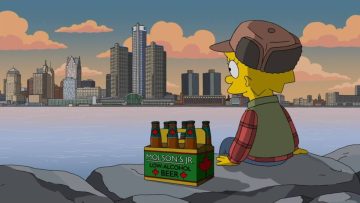

I started feeling ill the Sunday before last. I was more tired than usual; I had a stomach-ache and a low-grade fever. By Monday morning I knew I was unwell, and I spent the next week in bed.
I used to look forward to being ill: it meant missing school, or more recently, an excuse not to go to work and a chance to read and watch TV without feeling guilty. This is the privileged perspective of someone who has never actually been properly ill. I understand that now. During a genuine illness, fever and pain descend as a fog in the mind.
This is the privileged perspective of someone who has never actually been properly ill. I understand that now.
I had occasional moments of lucidity. During one, I remembered that Matisse had more or less reinvented art from his sickbed. His cut-outs, ground-breaking explorations of shape and form, came after he’d been diagnosed with bowel cancer and could only work from a wheelchair or his bed. The Blue Nudes are some of the purest attempts at representing the body that I’ve seen. Matisse saw his illness as a critical point of departure in his work. “Only what I created after the illness constitutes my real self, free, liberated.”
I held out for my own liberation. Looking for inspiration, I tried reading Ben Lerner’s novel The Topeka School – which takes on the small matters of toxic masculinity and the breakdown of language – but I kept getting confused about which line followed the one I was reading. My response to the writer’s exploration of the collapse of public speech? Perhaps. More likely I was just disorientated because my temperature was 39.3 degrees Celsius. On Friday, feeling a little better, I started to draw again. I didn’t quite break new ground in representing the human form, but I did manage a few self-portraits that make me look unrealistically handsome.

Sadly, illness didn’t bring any artistic epiphanies. I do, however, have a renewed appreciation for food. On Wednesday, my appetite returned after ten days of eating miso soup and bananas. I can’t think of a better diet to incentivise recovery.
Feeling better, I cooked chicken breasts, stuffed with goat’s cheese, wrapped in bacon, roasted with tomatoes and served with a rocket salad. It was a necessary tonic to the bland diet of my illness, but this kind of indulgence has not been typical of my lockdown. The pandemic has changed my attitude to food: I have been eating with abandon since the day I was born, bred on the assumption that food flows from a limitless font. Always available, always taken for granted.

Empty supermarket shelves exposed the fragility of this belief. But scarcity, though unsettling, has forced me to reconsider the ways in which I eat. I’m much more conscious of food waste now and use-by dates no longer seem inviolable. I’m more resourceful with the food that I do have: salt and vinegar crisps, it turns out, are an excellent filling for a sarnie. Sickbed epiphanies come in many forms. Matisse reinvented art; I’ve discovered a new way of eating a sandwich.




